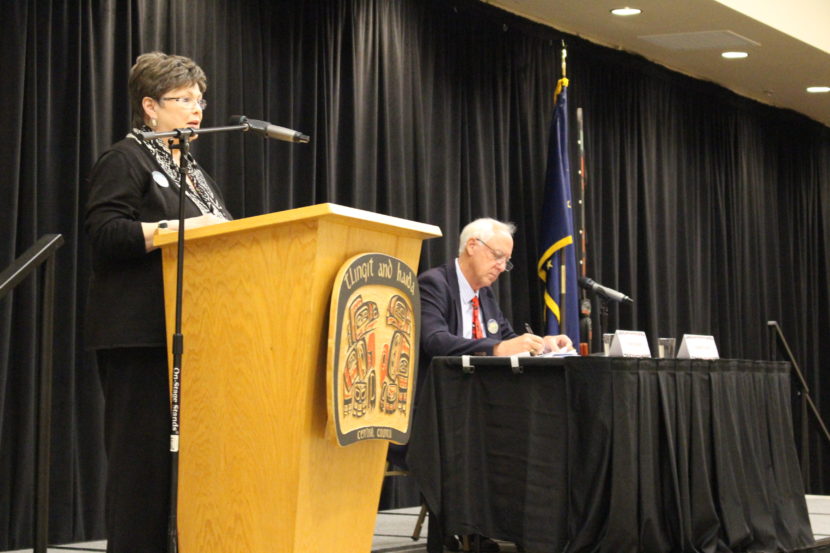
Juneau’s mayoral candidates attended the Native Issues Forum Tuesday. Spaghetti was on the menu, but so were questions about past assembly decisions and racial diversity.
Karen Crane and Ken Koelsch were welcomed by a full house at the Elizabeth Peratrovich Hall. Both candidates opened up with information about themselves before taking questions from the audience.
President of Sealaska Heritage Institute Rosita Worl said the gathering Celebration, which happens every two years, brings in more than $200 million to Juneau. She asked if the candidates would support the city being labeled as the “Northwest Coast Arts Capital” — an idea Worl introduced at the Innovation Summit.
“We see that we can celebrate cultural diversity and cultural diversity brings in economic benefits,” Worl said.
Both candidates seemed to like the concept. Crane said the borough provides financial support for Celebration and the assembly should work with Sealaska Heritage to help brand Juneau.
“This is an area where there is great potential for innovation and for an individual artist to grow and for growing the economy and its area we should be paying attention to and supporting in whatever way we can,” Crane.
Others in the audience wondered how the candidates felt about raising the city’s minimum wage to help offset the high cost of living in Juneau.
Koelsch said he was a firm a believer that the market should dictate wages.
“We have some jobs that are worth $100,000. We have some jobs that are worth $50,000,” Koelsch said. “And we have some jobs that have minimum wage attached to them because of the learning situation.”
Crane said she supported raising the minimum wage.
“I would disagree with Mr. Koelsch on the fact that not all minimum wage jobs are entry and learning jobs,” Crane said. “There are many jobs in the community with people who have been working for a long time and are still paid at a minimum wage.”
The candidates also answered questions from people who weren’t happy with past assembly decisions, like selecting a $16 million dryer to deal with city waste and amending the senior sales tax exemption. Crane — who was on the assembly at the time — stood behind those decisions.
Later, Goldbelt board member Ben Coronell asked how the candidates would address the assembly’s diversity problem.
“My concern is that we’re losing the Native voice and nobody really hears us,” Coronell said. “If we have just one race on the assembly and in all the key positions in the city management, my concern is growing.”
Crane used the Juneau Police Department as an example of an organization that’s trying to diversify and do better. She said there should be more interaction between the city and the tribes.
Koelsch said his philosophy on diversity was informed by a class taught by Walter Soboloff: a person doesn’t always assert themselves into the conversation.
“I will be expecting to come to you and asking what you feel is the need and the want,” Koelsch said.
Voters will elect a new mayor March 15.
If you’d like to learn more about the mayoral hopefuls, Juneau’s League of Women Voters will host a municipal candidate debate at 7:00 p.m. Wednesday in assembly chambers. KTOO will also broadcast the debate.
